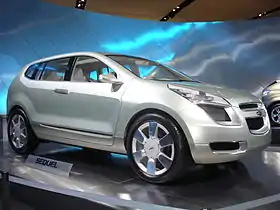| Chevrolet Sequel | |
|---|---|
 | |
| Overview | |
| Manufacturer | Chevrolet (General Motors) |
| Production | 2005 (auto show concept) 2006 (running concept) |
| Body and chassis | |
| Class | Full-size hybrid crossover SUV |
| Body style | 5-door SUV |
| Powertrain | |
| Engine | Hydrogen fuel cell |
| Dimensions | |
| Wheelbase | 3,040 mm (119.7 in) |
| Length | 4,994 mm (196.6 in) |
| Curb weight | 2,070 kg (4,564 lb) |
The Chevrolet Sequel is a purpose-built hydrogen fuel cell-powered concept car[1] and sport utility vehicle from Chevrolet, employing the then-latest generation of General Motors' fuel cell technology.[2]
The Sequel's powertrain includes an electronic control unit and a fourth-generation version of GM's fuel-cell stack. The Sequel became the basis for the design of the gas-powered Chevrolet Traverse, which was the replacement for the Uplander minivan.
Characteristics
The Sequel's fuel-cell stack has a rated power output of 73 kW (98 hp), supplemented by a lithium-ion battery pack rated at 65 kW (87 hp). One 65 kW (87 hp) electric motor drives the front wheels, and individual 25 kW (34 hp) wheel-motors (outboard of the rear brakes) drive each rear wheel, providing total tractive power of 115 kW (154 hp).
The Sequel stores 8 kg (18 lb) of gaseous hydrogen in three cylindrical, carbon-composite fuel tanks, pressurized to 700 bar (10,000 psi) and mounted longitudinally beneath the cabin floor. As a result, the range of the vehicle is more than 480 km (300 mi).
The Sequel is just short of five metres long (4,994 mm, 196.1 in.), on a similarly long (3,040 mm, 119.7 in.) wheelbase in order to accommodate the extremely long fuel tanks.
Possible production
GM made no commitment to building the Sequel. However, GM vice-chairman Bob Lutz has said he would push the company's strategy board to approve full production of a fuel-cell vehicle by 2011 model year. Due to the extremely high cost of fuel cells, GM opted to instead build several hydrogen-powered Chevrolet Equinox-based vehicles as testbeds. It then decided to change its direction of alternative-fueled vehicles, and unveiled the concept Volt in 2008, followed by the production version in 2010. As of October 2006, GM has built two Sequels.
See also
References
- ↑ Eberle, Ulrich; von Helmolt, Rittmar (2010-05-14). "Sustainable transportation based on electric vehicle concepts: a brief overview". rsc.org. Royal Society of Chemistry. Retrieved 2010-06-08.
- ↑ Eberle, Ulrich; Mueller, Bernd; von Helmolt, Rittmar (2012-07-15). "Fuel cell electric vehicles and hydrogen infrastructure: status 2012". Royal Society of Chemistry. Retrieved 2013-01-08 – via researchgate.net.
External links
- CHEVROLET SEQUEL 300-MILE ZERO EMISSIONS FUEL CELL DRIVE
- Fahey, J. "GM's wild gamble." In Forbes #175, 25 April 2005, pp. 78–83.
- "The Architect behind the Reinvention of the Automobile"